- Home
- Rick Yancey
The Extraordinary Adventures of Alfred Kropp Page 9
The Extraordinary Adventures of Alfred Kropp Read online
Page 9
He leaned back in his seat, closed his eyes, and said, “I must rest now. Wake me when you are tired and I will drive.”
“I don’t get it,” I said. I was pretty upset. There had been more blood flying around than in a horror movie. I had somehow found myself in an R-rated movie when all I wanted was PG-13. “There’s a whole lot I don’t get, Bennacio, like why we’re driving in a hot car to Nova Scotia; why people are trying to kill us; what the heck OIPEP is and how it fits into all this; how Mogart or anybody else could use a sword no matter how powerful to take over the whole world; and why any of this had to happen to me in the first place. But what I really don’t get is why you had to slaughter those guys like that.”
“They would have slaughtered us.”
“But how’s that make you any different from them?”
“They are servants of the enemy—”
“So?”
“—thralls of the Dragon. Would you have them live to pursue us to our end?”
“I just don’t get it, that’s all. Chopping off people’s heads and cutting out their guts . . .”
“You would not pity them if you knew them as I do.”
“I don’t know anybody who deserves something like that.”
“You are afraid. I understand.” His eyes were still closed. He spoke kindly to me, like a father would, or how I imagined a father would, since I never knew my father.
“You may pull off and find the nearest bus terminal if you wish, Kropp. I will give you the money for a ticket. I am well enough now to drive the rest of the way.”
I thought about it. I thought about it hard. His offer was tempting, but really, where would I go? I didn’t want to live with the Tuttles, and if I went back to Knoxville I wouldn’t have a choice. Then all of a sudden I thought about that little beach town in Florida where Mom used to take me every summer. Maybe I could go there and get a job and live on the beach until the world ended. There were a lot worse places you could wait for the end of the world.
And, really, what did I think I was doing—me, Alfred Kropp of all people—driving a hundred miles an hour in a Ferrari Enzo with a modern-day knight by my side? Who the heck did I think I was?
“It was because of what Mogart did to Mr. Samson, wasn’t it?” I asked finally. “The reason you mutilated those guys.”
“Samson was my captain, Kropp,” Bennacio said. “And there are some debts that cry to heaven to be repaid.”
19
We were about twenty-five miles north of Harrisburg, Pennsylvania, when Bennacio told me to take the next exit. We had been on the road for over sixteen hours and maybe he noticed how much I was yawning and rubbing my eyes. We hadn’t stopped since Edinburg except to fill up on gas and use the john.
I started to turn into a Super 8 just off the exit, but Bennacio told me to keep driving. I drove west on Highway 501, which hugged the edge of Swatara State Park. Trees crowded both sides of the road and there were no streetlights; it felt as if we were driving through a tunnel. I thought maybe the idea was to park somewhere in the woods and sleep in the car. We passed a sign that said “Suedberg 2 mi.”
About a mile past the sign, Bennacio told me to turn onto a little dirt lane that wound up a hill, then through a dense group of trees. On the other side of the trees was a bridge that spanned a little creek, and after the bridge the road narrowed until it ended at a house set back in the woods. It reminded me of the houses from those old scary children’s stories, like the witch’s house in Hansel and Gretel.
Maybe this was like a safe house for the knights, a refuge for when they were in the area, cavorting about on an adventure.
I stopped the car and Bennacio said, “Kropp, you must stay here for a moment.”
He got out of the car and I called to him before he shut the door. “How come?”
“I don’t know how you will be received.”
He mounted the steps. The front door opened, and a dark shape was silhouetted in the light from inside. This person wore a dress, so I figured it was a woman. She hugged Bennacio, rising on her toes to kiss both his cheeks. She bent her head while he whispered in her ear. Then her head came up and she looked at me.
Maybe she said something to Bennacio, because he waved his hand toward me, and the two of them disappeared inside.
I got out and locked the car: The place was isolated and you never know what might be lurking in the woods. I was still pretty shaken up by our encounter with Mogart’s henchmen back in Edinburg, and every shadow seemed to be holding a two-foot-long black dagger. I was finding out the hard way that the world is always more dangerous than you think it is.
They had closed the door behind them and I hesitated for a second before going in. Was I supposed to knock? Maybe Bennacio’s wave didn’t mean Come on in, Kropp. Maybe it meant Stay in the car or forfeit your life! Then I smelled bread fresh from the oven and my stomach decided for me; I hadn’t eaten anything since the corn dog.
I opened the door after a quick little knock, a sort of compromise between knocking and not knocking, and stepped inside.
The front parlor was empty, but I could hear voices coming from down the hall, which also seemed to be where the bread smell was coming from. I stepped into the parlor. A small fire was going in here, and in one corner was a little wooden stand where a candle was burning. There was a picture displayed there of a guy about my age, with long blond hair and large, bright blue eyes, wearing a purple tunic and looking grimly at the camera, a silver headband across his forehead. A single white rose lay in front of the picture. It was some kind of shrine, I guessed, and I was sure without knowing exactly how I was sure that I was looking at a picture of one of Mr. Samson’s knights.
“Kropp.”
Bennacio was standing in the entry. I pointed at the picture.
“A knight?” I asked.
He nodded. “Windimar.”
“This is his house?”
“This is the house of his mother. We shall stay here for the night.”
“I thought we were in a hurry.”
“We are, but even knights must eat and rest, and I desire her counsel. Miriam is a soothsayer, Kropp.”
“Really? Wow. What’s a soothsayer?”
“She has the gift of sight.”
“You mean she can see the future?”
He didn’t answer. I followed him down the hall to the kitchen, where a large oak table took up most of the space. The table was one of those sturdy, rough-hewn jobs, with thick legs and a top about five inches thick. It was covered with steaming dishes: a stew in an earthenware bowl, pots of potatoes and vegetables, fruit in a big wooden bowl, and five loaves of freshly baked bread on a cutting board in the shape of a fish.
Windimar’s mother moved around the table, setting out the plates and these huge mugs that reminded me of pirate movies and grog. I stood there because Bennacio was standing, feeling big and awkward, like I was taking up too much space, light-headed from hunger, and nervous for some reason. Maybe it was because nobody was talking and she had a grim look on her face as she set out the plates. She was wearing a black full-length dress and her steel gray hair was pulled into a bun so tight, it looked painful. Her eyes were the same bright sky blue as her son’s, her nose perfectly straight, her lips slightly oversized for someone her age, and the only wrinkles I saw were around the corners of her eyes, which were swollen slightly, I guessed from crying.
She set places for two, one on either side of the table. Bennacio sat down at one and, relieved, I sat at the other. He muttered something that sounded like Latin over the food and we set in while she stood at the sink washing up the cookery.
It was one of the best meals I ever had. The stew was beef-based, very thick and hot, the bread so buttery, it practically dissolved on my tongue, and even my drink had substance to it, kind of sweet-tasting, like honey, warm like hot apple cider, but not apple-based . . . I don’t know what the heck it was, but it was good.
Miriam stacked the pots in the d
rainer to dry and sat down next to Bennacio. They spoke in low voices in a language I didn’t understand. It sounded not quite French and not quite Spanish and it definitely wasn’t German. Maybe it was Latin or whatever language they spoke in Arthur’s day, like Celtic.
I was on my third helping of stew and second loaf of bread when their conversation got intense; I guessed they were having an argument about something and I guessed too that the something was me, because she kept glancing at me and at one point jabbed a finger in my direction. I was pretty uncomfortable, them talking about me while I sat right in front of them, and I think Bennacio knew that, because he switched to English.
“Do not forget,” he said to her. “Without him I would not be here.”
She answered in a thick accent, “And you forget, Lord Bennacio, without him my son would be here.”
So it was about me taking the Sword, which got the knights, including her son, killed. I dropped my spoon into the bowl. I wasn’t hungry anymore.
“Windimar did not die for anything Kropp did; he perished keeping a vow he made to heaven, Miriam.”
“Yet his vow would not have been put to the test if not for him.” Again she jabbed her finger at me.
“Perhaps. At last to our generation the test has come, whether born of the divine or the diabolical who can say? Yet we must take comfort, Miriam, in the fact that heaven has used odder instruments.”
“He is an instrument of destruction,” she spat back at him. “At the critical hour he will fail you, Bennacio. He will stand aside while you fall.”
“Now that just isn’t true!” I said. “Ma’am.” I couldn’t keep quiet anymore. “I screwed up, big time, but ever since I’ve been trying to do the right thing. Maybe you don’t know this, but Mogart killed my uncle. Maybe it’s true I’m partly responsible for all this mess, for the Sword being lost and all the knights . . . and what happened to the knights. So that’s, um, true, and the only way I can make up for it is by helping Bennacio here.”
“No,” she said. “I have seen it. You will fail him, and the last knight will fall.” Her eyes narrowed and somehow the room narrowed too. She was staring at me at the other end of a long, darkening tunnel, her crooked finger pointed at my nose. “And you too shall perish, Alfred Kropp, alone in the dark, where neither day breaks nor night falls. The Dark One will pierce your heart and—upon his command—you will die.”
20
Bennacio and I sat in the parlor after dinner. It was half past one in the morning and Bennacio said we had to leave at dawn, but neither of us felt sleepy. My seat was right next to Windimar’s shrine, and his big blue eyes stared at me like a rebuke.
Bennacio wasn’t in a talkative mood. He sat with his elbows on the armrests, his long fingers laced together, staring at the fire.
Miriam’s words were still echoing in my head, and his silence wasn’t helping my creepy mood any. So I asked, “How do you become a knight? I mean, I know you have to come from one of the original knights, but you guys aren’t born knowing how to handle a sword and all that stuff. What do you do, go to knight school?”
If he got the joke, he didn’t let on. “We are trained by our fathers. In some cases, we apprentice under another knight, if the father is unable.”
“What about Windimar’s dad?” He was young enough for his father to still be alive, judging by his picture in the gilded frame beside me.
“His father died before he could complete the training.”
“You completed Windimar’s training, didn’t you, Bennacio?”
He didn’t say anything. Miriam came into the room with a big brandy snifter for Bennacio. She asked me if I wanted anything and I could tell that took a lot out of her, being gracious to me, but I told her no.
She said something in that funny-sounding language and Bennacio shook his head, but she came back at him pretty insistently, and he finally shrugged and shook his head, waving his hand at her as if to say, Whatever, I’m too tired to argue. She left the room.
“How’d his father die?” I asked, expecting to hear a story about a jousting tournament gone bad.
“His riding lawn mower flipped over on him.”
“You’re kidding.”
“Even knights are not immune to absurd ends, Kropp.”
Miriam came into the room again, this time carrying a long black case that looked like a musical instrument carrier. Maybe she expected Bennacio to play a dirge on an oboe or something. She laid it at his feet, fussing at him in that strange tongue, until he finally said, in English, “Very well, Miriam.”
“He would want you to have it.” She couldn’t seem to let the argument go.
“And I shall take it, in his memory. I pray I will not have to use it.”
“You will use it, Lord Bennacio, before the sun sets on the morrow.”
She left us alone. I cleared my throat. “Do her visions always come true?” I asked, because who wants to die alone in the dark, where no days break or nights fall, pierced in the heart by the Dark One?
He said, “I have never questioned her gift. But you must understand, Kropp, she is nearly overcome by grief, and grief always clouds our insight, even the insight of the gifted. From his birth, Miriam has known Windimar would die a bloody death. Imagine that if you can.”
“I guess it could mess you up. I remember when my mom first told me she was dying from cancer . . .” I couldn’t go on. Bennacio nodded as if he understood I couldn’t, and patted my arm.
After he finished his brandy, Bennacio announced it was time we got some sleep because he planned to drive straight through to Canada. There was another long discussion or argument with Miriam about sleeping arrangements, I guess, and I wasn’t sure who won, but I figured it was Bennacio by her fierce expression and the way she stomped down the hall, leading me to a room.
It was Windimar’s old room. There was no bathroom, but there was an antique washstand with a bowl set in a hollowed-out shelf and a pitcher of steaming water. I washed my face and brushed my teeth in the warm water from the pitcher, and then I looked around the room.
A rocking chair sat beside a small fireplace on the wall opposite the bed, where a silver and gold crucifix was hung over the headboard. On that side was a tapestry that looked very old but couldn’t have been that old, because there was Mr. Samson mounted on a great white horse in full armor and around him eleven men dressed in purple and holding shields painted with a horse and rider. At least it looked like Mr. Samson—there was the same large head and flowing golden hair, and I picked out a tall knight that could have been Bennacio and a knight with bright blue thread for eyes, Windimar, I guessed, staring right at me, and he was one good-looking guy; he looked a little like Brad Pitt, except for those bright blue eyes. Jealousy never did anybody any good and I wasn’t really the jealous type, but this guy was learning swordplay and how to ride a horse and pledging his sacred honor to die for a noble cause when I was sitting by my mom’s hospital bed watching her die and getting the stuffing beaten out of me at football practice.
I opened the closet door and inside was a full suit of armor, shined to a mirror finish, with a six-foot lance leaning against the wall beside it. It was fully assembled and I gave a little yelp when I opened the door, thinking I was the victim of a medieval ambush.
I stared at that suit of armor for a long time. It was polished so bright, I could see little shards of myself reflected in the metal, twenty-five Kropps at least, distorted like funhouse images. Shaggy brown hair, brown eyes, average-sized nose, chin, ears, teeth. If there was one trait these knights in the tapestry shared, it was that none of them looked average. Not all were as pretty as Windimar, as noble-looking as Samson, or as intense as Bennacio, but there was a set to their jaw, a certain look in the eyes they all had in common. I wondered if I put on the armor in the closet something like that might happen to me, the way even the geekiest guy in school looked macho in his ROTC uniform. I had this nutty urge to pull the armor off its stand and put it on. Then I tho
ught that would be the ultimate gesture of disrespect, donning the armor of the knight who died because of me. I closed the closet door.
I turned out the light and crawled into the bed fully dressed and it bothered me, Christ hanging right over me, looking down like, What the heck are you doing here? that it took a long time for me to fall asleep. It didn’t help that I could hear Miriam crying down the hallway, a low moaning sort of weeping. For a crazy second I thought about finding her and telling her I was sorry, which I kind of did already but not really in the kitchen. But Miriam didn’t want to hear about me being sorry; she wanted her son back. Probably if I went in there she’d find the nearest heavy object and bash me over the head with it.
Her crying went on for a long time. I had cried for my mom when she died, but not the way Miriam was crying for Windimar. It was while I listened to her cry that I realized what I did went beyond Uncle Farrell, Mr. Samson and the knights, Bennacio and Windimar. What I did was slamming people I didn’t even know about, like Miriam, the shock waves of my boneheadedness spreading out in ever widening circles, like a boulder the size of Montana landing in the ocean or that huge asteroid that hit the earth millions of years ago, wiping out the dinosaurs.
I finally fell asleep and dreamed I was scrambling up this rocky slope, not exactly a mountain, more like a slag heap of broken rock and tiny glittering shards of quartz or maybe those crystals you see growing inside of caves, sparkling like big wet teeth in the moonlight. I kept slipping and sliding as I tried to reach the top. The palms of my hands and my knees were all cut up and bleeding. Every time I gained a couple feet, I lost one, but it seemed very important I get to the top. I caught ahold of a big boulder near the summit and pulled myself up.
I rested awhile, looking at the shimmering shards littering the hill beneath me, feeling kind of proud of myself that I made it at least this far.
Finally I stood up, turned, and jumped the rest of the way. The top was perfectly flat and covered with long grasses whose tips reached up and caressed my aching legs as I walked toward this yew tree.

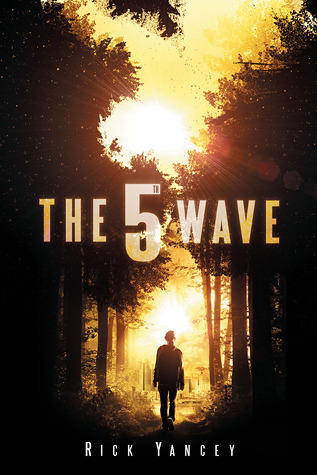 The 5th Wave
The 5th Wave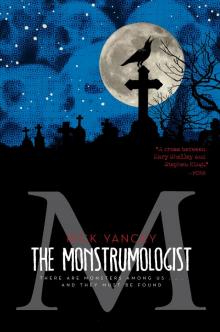 The Monstrumologist
The Monstrumologist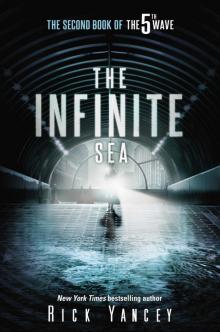 The Infinite Sea
The Infinite Sea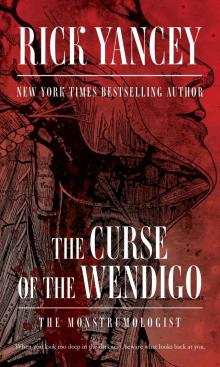 The Curse of the Wendigo
The Curse of the Wendigo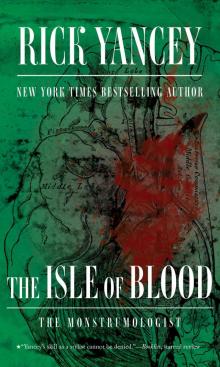 The Isle of Blood
The Isle of Blood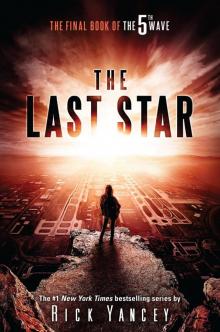 The Last Star
The Last Star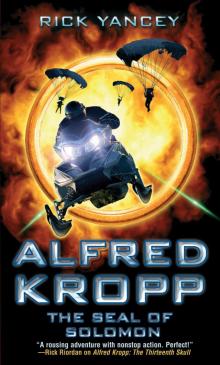 The Seal of Solomon
The Seal of Solomon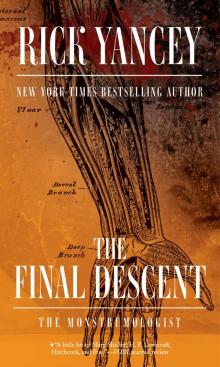 The Final Descent
The Final Descent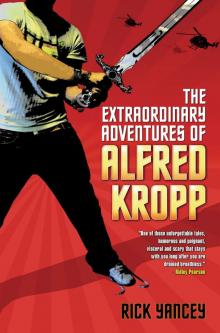 The Extraordinary Adventures of Alfred Kropp
The Extraordinary Adventures of Alfred Kropp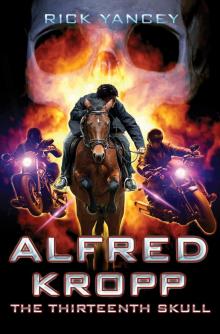 The Thirteenth Skull
The Thirteenth Skull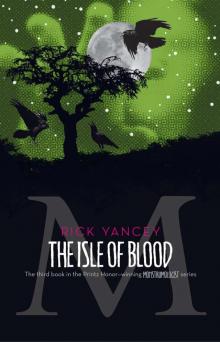 The Isle of Blood (Monstrumologist)
The Isle of Blood (Monstrumologist)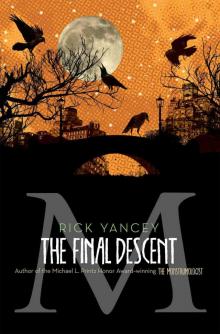 The Final Descent (The Monstrumologist)
The Final Descent (The Monstrumologist)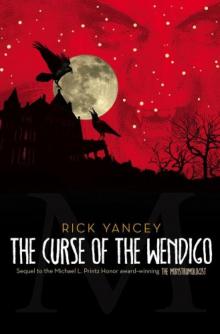 The Curse of the Wendigo (The Monstrumologist, Book 2)
The Curse of the Wendigo (The Monstrumologist, Book 2)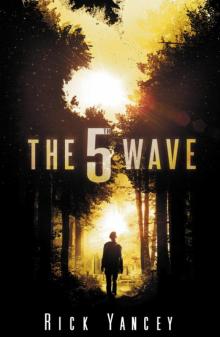 The 5th Wave t5w-1
The 5th Wave t5w-1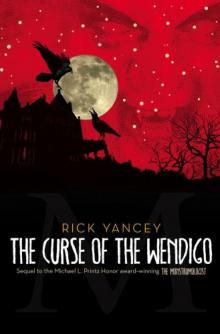 The Curse of the Wendigo (The Monstrumologist, Book 2) m-2
The Curse of the Wendigo (The Monstrumologist, Book 2) m-2